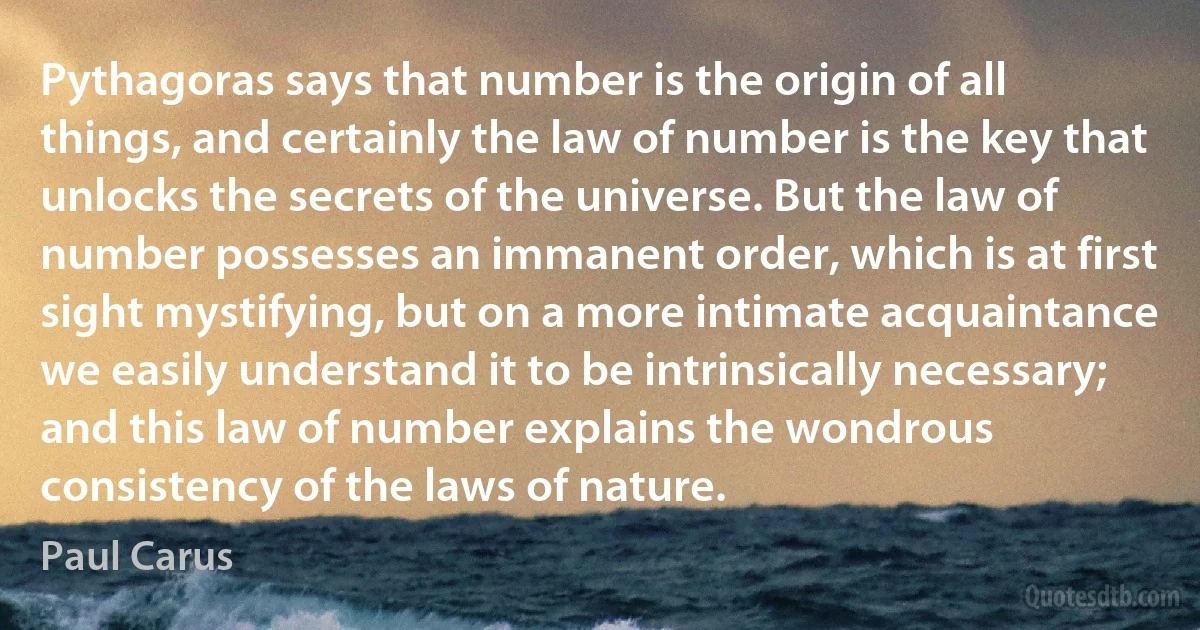Pythagoras Quotes - page 2
But after these, Pythagoras changed that philosophy, which is conversant about geometry itself, into the form of a liberal doctrine, considering its principles in a more exalted manner; and investigating its theorems immaterially and intellectually; who likewise invented a treatise of such things as cannot be explained in geometry, and discovered the constitution of the mundane figures.

Proclus
The votaries of Pythagoras of Samos have this story to tell of him, that he was not an Ionian at all, but that, once on a time in Troy, he had been Euphorbus, and that he had come to life after death, but had died as the songs of Homer relate. And they say that he declined to wear apparel made from dead animal products and, to guard his purity, abstained from all flesh diet, and from the offering of animals in sacrifice. For that he would not stain the altars with blood; nay, rather the honey-cake and frankincense and the hymn of praise, these they say were the offerings made to the Gods by this man, who realized that they welcome such tribute more than they do the hecatombs note and the knife laid upon the sacrificial basket.

Philostratus
Apollonius accordingly paused for a minute and then, fixing his eyes, as it were, on the discourse he had heard, he spoke as follows: "... I am not come here to ask your advice about how to live, insomuch as I long ago made choice of the life which seemed best to myself ... For I discerned a certain sublimity in the discipline of Pythagoras, and how a certain secret wisdom enabled him to know, not only who he was himself, but also who he had been; and I saw that he approached the altars in purity, and suffered not his belly to be polluted by partaking of the flesh of animals and that he kept his body pure of all garments woven of dead animal refuse; and that he was the first of mankind to restrain his tongue, inventing a discipline of silence ... I also saw that his philosophical system was in other respects oracular and true. So I ran to embrace his teachings ..."

Philostratus
The Pythagoreans discovered the existence of incommensurable lines, or of irrationals. This was, doubtless, first discovered with reference to the diagonal of a square which is incommensurable with the side, being in the ratio to it of √2 to 1. The Pythagorean proof of this particular case survives in Aristotle and in a proposition interpolated in Euclid's Book X.; it is by a reductio ad absurdum proving that, if the diagonal is commensurable with the side, the same number must be both odd and even. This discovery of the incommensurable... showed that the theory of proportion invented by Pythagoras was not of universal application and therefore that propositions proved by means of it were not really established.... The fatal flaw thus revealed in the body of geometry was not removed till Eudoxus discovered the great theory of proportion (expounded in Euclid's Book V.), which is applicable to incommensurable as well as to commensurable magnitudes.

Thomas Little Heath
Homer, Hesiod, Pythagoras, Plato, and Cicero, just to name a few, all lived in pagan societies. Some of the greatest political and military leaders of all time, such as Alexander the Great, Pericles of Athens, Hannibal of Carthage, and Julius Caesar of Rome, were all pagans, or else living in a pagan society.

Brendan Myers
I think it is important that people be made aware that the vegetarian movement has a venerable history behind it. It didn't spring full-blown from the head of a flower child in the 1960′s. It really begins with Pythagoras in the West in the 6th century BC and has reasserted itself periodically ever since.

Rynn Berry
Golden Verses So-called because they are 'good as gold.' They are by some attributed to Epicarmos, and by others to Empedocles, but always go under the name of Pythagoras, and seem quite in accordance with the excellent precepts of that philosopher. They are as follows Ne'er suffer sleep thine eyes to close Before thy mind hath run O'er every act, and thought, and word, From dawn to set of sun For wrong take shame, but grateful feel If just thy course hath been Such effort day by day renewed Will ward thy soul from sin. E. C. B.

Pythagoras
What is imagination? Psychologists tell us that it is the plastic or creative power of the soul; but materialists confound it with fancy. The radical difference between the two, was however, so thoroughly indicated by Wordsworth, in the preface to his Lyrical Ballads, that it is no longer excusable to interchange the words. Imagination, Pythagoras maintained to be the remembrance of precedent spiritual, mental, and physical states, while fancy is the disorderly production of the material brain.

Helena Petrovna Blavatsky
Pythagoras teaches among other excellent doctrines this also, "walk not on the highways.” This does not mean that we should climb steep hills-the school was not prescribing foot-weariness-but it indicates by this figure that in our words and deeds we should not follow popular and beaten tracks.

Philo
Professor Halbfass follows a scholar's methodology in determining the extent of Indo-Greek contact. He is determined to find a document, some written mention, some journey relating to this contact before he would admit it, but by their very nature such evidences can only be very rare considering the time that has lapsed and the changes that have been wrought. But if Professor Halbfass had followed a more inward method or criterion of looking at Greek literature, he would have easily found plentiful evidence of a living Indo-Greek contact, particularly at the deeper level of the spirit. Both shared a common spiritual approach; both intuited man and his world in the same way; both expressed their spiritual intuition in the language of Gods; both taught âtma-vâda, and the theory of Two Selves and Two Ways; both taught the theory of karma, rebirth and moksha. In fact, the Greece of Pythagoras, Plato and Plotinus has more in common with Hindu India than with Christian Europe.

Ram Swarup
And therefore, so far as we are concerned, the followers of Pythagoras, who abstain from all things that contain life may do as they please; only observe the different reason for abstaining from things that have life on the part of the Pythagoreans and our ascetics. For the former abstain on account of the fable about the transmigration of souls, as the poet says:-"And some one, lifting up his beloved son,Will slay him after prayer; O how foolish he!”We, however, when we do abstain, do so because "we keep under our body, and bring it into subjection,” (Cf. I Co. ix. 27) and desire "to mortify our members that are upon the earth, fornication, uncleanness, inordinate affection, evil concupiscence;” (Cf. Col. iii. 5) and we use every effort to "mortify the deeds of the flesh.” (Cf. Rom viii. 13)

Origen
Others of them employ outward marks ... They style themselves Gnostics. They also possess images, some of them painted and others formed from different kinds of material. They maintain that a likeness of Christ was made by Pilate at that time when Jesus lived among them. They crown these images, and set them up along with the images of the philosophers of the world, such as Pythagoras, Plato, and Aristotle, and the rest. They have also other modes of honoring these images just like the Gentiles.

Irenaeus
Pythagoras and Orphic mysteries stand very high in Greek religion and they have family likeness with Hinduism. Lecky in his History of European Morals quotes an old tradition in Greece that Pythagoras had himself come to India and learnt philosophy from the gymnosophists. It seems he believed in an "all-pervading soul" which is at least one important attribute of Hindu âtman. He believed in rebirth or transmigration; he taught and practised harmlessness or non-injury; chastity was the leading virtue of his school of thought; he taught silence; he taught that the end of man is to "become like God". Orphic mysteries taught release (lysis) from all material entanglements, which is close to moksha of the Hindus.

Ram Swarup



